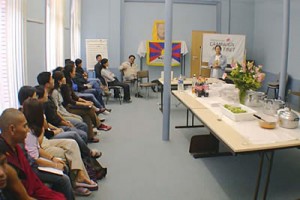
Participants in the 2003 Tibetan Youth Leadership Program, Europe, with ICT Europe Executive Director Tsering Jampa, far right.
The Program began with a call from Mr. Migyur Dorjee of the Bureau du Tibet in Brussels to the young Tibetans to take the lead in our struggle and to give due recognition to Tibetan linguistic and cultural heritage. Tsering Jampa, Executive Director of the International Campaign for Tibet-Europe welcomed the participants.
Participants had an overview of Tibetan history as well as on the Tibetan democratic structure in exile. They learnt about initiatives on Tibet at the United Nations and theoretical situation of Tibet in international law. They participated in workshops on communication and messaging.
“We are encouraged by the tremendous response to our first initiative in our Tibetan outreach program,” said Tsering Jampa, Executive Director of International Campaign for Tibet Europe.
There were sessions on looking towards Tibet, studying the economic and cultural situation there, about developmental projects and role of Tibetan youth. The TYLP participants received a theoretical explanation of the concept of non-violence and a testimony of a Chinese perspective of the Tibetan issue. Participants also discussed the evolving Tibetan culture and learned about Tibetan performing arts.
The program created a new network of young exile European Tibetans, some of whom rarely have the opportunity to debate and socialise with other Tibetans living in their countries. “This is the very first time I am seriously discussing with my fellow Tibetans on the Tibetan cause. I liked the way the speakers presented the issues and especially their attention towards our questions and viewpoints,” commented one of the participants during the evaluation.
They were given a perspective of international support for Tibet and specifically about the perspective of the situation in Europe. During the visit to the European Parliament they heard about the efforts that the parliamentarians are undertaking to support the endeavour of the Dalai Lama to find a mutually satisfactory solution. Ngawang Sangdrol, former Tibetan political prisoner, who attended the TYLP, addressed the Intergroup on Tibet. She spoke of the positive effect that support from the international community had on the Tibetans inside Tibet, particularly the political prisoners. Sangdrol told the group that the Dalai Lama’s Middle Way Approach could provide a viable solution to the current critical situation in Tibet. The youngest member of the group, Tenzin Tseten Zingshuk, spoke on behalf of the TYLP participants and urged the parliamentarians to continue their concerted action on Tibet. Mr. Thomas Mann, president of the Tibet Intergroup in the European Parliament, gave assurance of their commitment to work on Tibet.
Distinguished speakers at the TYLP were historian Tsering Shakya; Ngawang Drakmargyapon, UN Affairs Coordinator at the Tibet Bureau in Geneva; Sonam Tsering Frasi, Tibetan parliamentarian in Europe; Namgyal Lhamo, Tibetan performing artist; Kate Saunders, Tibet researcher and journalist; Janice Christensen, campaign and communications consultant, Pathways Inc.; Thupten Geleg Genkhang, Tibetan journalist (VOA); Christa Meindersma, international lawyer; Jonathan Sisson of the Interntional Fellowship of Reconciliation; Sander Tideman of the Bridge Fund; Lodi Gyari, special envoy of H.H. the Dalai Lama; Luci Jin, Federation for a Democratic China; Tsaye Kelsang; Kunchok Woser, Ngawang Sangdrol, recent arrivals from Tibet; Kelsang Gyaltsen, envoy of H.H. the Dalai Lama; Lotte Leicht of the Human Rights Watch-Europe. Staff from ICT Europe, Germany as well as Washington, D.C. also acted as resource persons.

